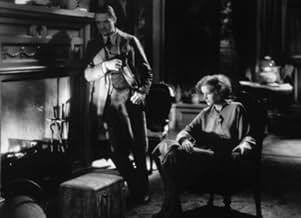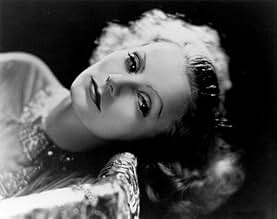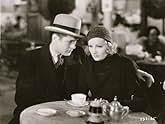VALUTAZIONE IMDb
6,2/10
659
LA TUA VALUTAZIONE
Aggiungi una trama nella tua linguaYvonne is a beautiful model who loves frequenting the Parisian bohemian life, because she loves hobnobbing with artists.Yvonne is a beautiful model who loves frequenting the Parisian bohemian life, because she loves hobnobbing with artists.Yvonne is a beautiful model who loves frequenting the Parisian bohemian life, because she loves hobnobbing with artists.
- Regia
- Sceneggiatura
- Star
- Premi
- 1 vittoria in totale
Clara Blandick
- Madeleine's Mother
- (non citato nei titoli originali)
Sidney Bracey
- Waiter with Coffee and Cream Pitchers
- (non citato nei titoli originali)
Recensioni in evidenza
In a plot with some similarities to the much better Camille, Greta Garbo is an artist's model who like the rest of her peers lives on the financial favors of those in the artist's colony. I wouldn't doubt she does those things professionally as well. It costs a lot to be an artist's Inspiration.
However she gets inspired by a young callow youth played by Robert Montgomery and she's willing to shake off all her patrons, chief among them being Lewis Stone for life with a young man entering France's diplomatic service. No matter because Lewis Stone seems rather enthralled with Karen Morley at the moment.
Probably Inspiration would not sit well with today's audiences. It's not one of Garbo's better vehicles.
One thing I did like about Inspiration was its torch song theme. Though it's not sung in Inspiration, the theme has lyrics and it's entitled How Long Will It Last. It was recorded by Bing Crosby the following year and was one of his early successes. It's the best thing about Inspiration.
I'd really recommend that you see this side by side Camille and judge for yourself how much better Camille is. Still Garbo and Montgomery do their best by this dated melodrama.
However she gets inspired by a young callow youth played by Robert Montgomery and she's willing to shake off all her patrons, chief among them being Lewis Stone for life with a young man entering France's diplomatic service. No matter because Lewis Stone seems rather enthralled with Karen Morley at the moment.
Probably Inspiration would not sit well with today's audiences. It's not one of Garbo's better vehicles.
One thing I did like about Inspiration was its torch song theme. Though it's not sung in Inspiration, the theme has lyrics and it's entitled How Long Will It Last. It was recorded by Bing Crosby the following year and was one of his early successes. It's the best thing about Inspiration.
I'd really recommend that you see this side by side Camille and judge for yourself how much better Camille is. Still Garbo and Montgomery do their best by this dated melodrama.
The plot of this film is very bland, but the plots of many of Garbo's films are very bland. People only really came (come) to her films for her. Her mystique, her sparkle, her aloof charm and her husky voice (or over-the-top mannerisms, if we're watching a silent film). In this one, she fails to deliver.
Basically, Garbo is a kept woman in this one. She serves as an artist's model, among other things. She meets Robert Montgomery at a party, and they fall in love and start an affair. The ending to this one is so moralistic it almost made me gag, but at least no one randomly died like they usually do in Garbo films, and at least she didn't decide that life was no longer worth living. However, I feel that the film would have been better had one of the leads died. I'm sorry to sound macabre, but it's true. (I believe there was one point in this film where somone did commit suicide).
Robert Montgomery plays the same character he always plays.
Bob and Garbo aren't a great match, and they don't have a lot of chemistry together. Someone like Norma Shearer or Joan Crawford would have worked better in this role, I think. For someone who was such a smashing success, how did Garbo manage to pick such bad films to star in? Did she just not want to be a movie star? In this film, she certainly feels like it.
Basically, Garbo is a kept woman in this one. She serves as an artist's model, among other things. She meets Robert Montgomery at a party, and they fall in love and start an affair. The ending to this one is so moralistic it almost made me gag, but at least no one randomly died like they usually do in Garbo films, and at least she didn't decide that life was no longer worth living. However, I feel that the film would have been better had one of the leads died. I'm sorry to sound macabre, but it's true. (I believe there was one point in this film where somone did commit suicide).
Robert Montgomery plays the same character he always plays.
Bob and Garbo aren't a great match, and they don't have a lot of chemistry together. Someone like Norma Shearer or Joan Crawford would have worked better in this role, I think. For someone who was such a smashing success, how did Garbo manage to pick such bad films to star in? Did she just not want to be a movie star? In this film, she certainly feels like it.
Cocktail circuit coquette trades in her lavish lifestyle for the sake of a more genuine attachment, the pursuit of which only seems to involve compromise, disappointment and despair. It's a philosophical little film suffused with romantic melancholy.
There are more famous films where Garbo says she wants to be alone, and where she laughs, but she does both here too. There's little in the way of action but it has a pleasing lilt as it shifts from high glamour to an almost expressionist gloom.
Two fine contrasting scenes - a sunny breakfast in the park and a snowy night - capture the mood of the transition between hope and resignation - and we get to see Garbo go from some of Adrian's most impressive creations to a dishevelled dressing gown.
Was saving this for a sleepless night and it went down a treat in the small hours when it was just me and the night and Garbo.
There are more famous films where Garbo says she wants to be alone, and where she laughs, but she does both here too. There's little in the way of action but it has a pleasing lilt as it shifts from high glamour to an almost expressionist gloom.
Two fine contrasting scenes - a sunny breakfast in the park and a snowy night - capture the mood of the transition between hope and resignation - and we get to see Garbo go from some of Adrian's most impressive creations to a dishevelled dressing gown.
Was saving this for a sleepless night and it went down a treat in the small hours when it was just me and the night and Garbo.
Many (perhaps too many) of Garbo's films are rated primarily on the basis of her performance, with everything else secondary. This is most unfortunate, since MGM - very much to their credit - did not arrange her pictures primarily as star vehicles: the leading men and supporting players are usually strong performers. Considering the fairly large number of pictures in which she starred, her performances do not encompass a wide variety of characterizations: she is typically a woman who has loved well but not wisely (and probably too often), a worldly and world-weary femme fatale preoccupied with the futility of searching for real happiness, yet finding no viable alternative in the life she knows.
This is once again her character in "Inspiration," a relatively obscure Garbo film which compares very favorably with the later and much better-known "Camille." The stories have much in common, as do her performances. While "Camille" obviously had a considerably larger budget, resulting in more impressive production values, the dramatic values in "Inspiration" are at least equal to those of the other.
Of particular note: Garbo, dismissed by her lover, huddles in a storefront, waiting for him to pass on a dark, rainy day - finally emerging when she spots him, only to be rejected once again - without a word - with nothing more than a curt shake of the head as he walks on.
And Lewis Stone, having ended the liason with his young, despairing mistress in an upper apartment, descends the staircase, pauses ever so briefly at the building entrance to note her lifeless body now crumpled on the sidewalk, and continues on his way.
This is once again her character in "Inspiration," a relatively obscure Garbo film which compares very favorably with the later and much better-known "Camille." The stories have much in common, as do her performances. While "Camille" obviously had a considerably larger budget, resulting in more impressive production values, the dramatic values in "Inspiration" are at least equal to those of the other.
Of particular note: Garbo, dismissed by her lover, huddles in a storefront, waiting for him to pass on a dark, rainy day - finally emerging when she spots him, only to be rejected once again - without a word - with nothing more than a curt shake of the head as he walks on.
And Lewis Stone, having ended the liason with his young, despairing mistress in an upper apartment, descends the staircase, pauses ever so briefly at the building entrance to note her lifeless body now crumpled on the sidewalk, and continues on his way.
INSPIRATION is Greta Garbo's third talking picture and less static than "Anna Christie" and "Romance". In 1931 Garbo was at the height of her fame and INSPIRATIION was an expensive MGM production. But now it's an undeservedly obscure Garbo film. The scenes are varied, glamorous and entertaining. You can see clearly it was an expensive production: There are some grand and striking scenes like Garbo and Montgomery in the stairwell, Garbo in the artist studio, the snow scenes, the street scenes at night. Great care was taken with every scene. It's melodrama but there's also some comedy included. (It's very unlike the gloomy "Anna Christie"). Garbo is amazing in this film and very beautiful, from the first scenes when she joins the party, relaxed and smiling - until she sees Montgomery and she realizes what she's missing, till the last scene when she writes the letter. I also like Robert Montgomery here as an introverted man, his acting is great.
I would love to see this film in a theater for maximum impact. Ignore the abysmal reviews by those who are cynical and desire more than fine old-fashioned entertainment. This is true inspiration.
I would love to see this film in a theater for maximum impact. Ignore the abysmal reviews by those who are cynical and desire more than fine old-fashioned entertainment. This is true inspiration.
Lo sapevi?
- QuizRelease of the movie was delayed because of a lawsuit Pathé brought against MGM. Although the novel by Alphonse Daudet was in public domain in the USA, it was still under copyright protection in Europe. Pathé won the lawsuit.
- Citazioni
André Montell: But I'm doing all the talking - please lets talk about you.
Yvonne Valbret: There isn't much to tell - I'm just a nice young woman - not too young, and not too nice - I hope!
- ConnessioniAlternate-language version of Sapho (1934)
I più visti
Accedi per valutare e creare un elenco di titoli salvati per ottenere consigli personalizzati
- How long is Inspiration?Powered by Alexa
Dettagli
Botteghino
- Budget
- 438.000 USD (previsto)
- Tempo di esecuzione
- 1h 14min(74 min)
- Colore
Contribuisci a questa pagina
Suggerisci una modifica o aggiungi i contenuti mancanti





































